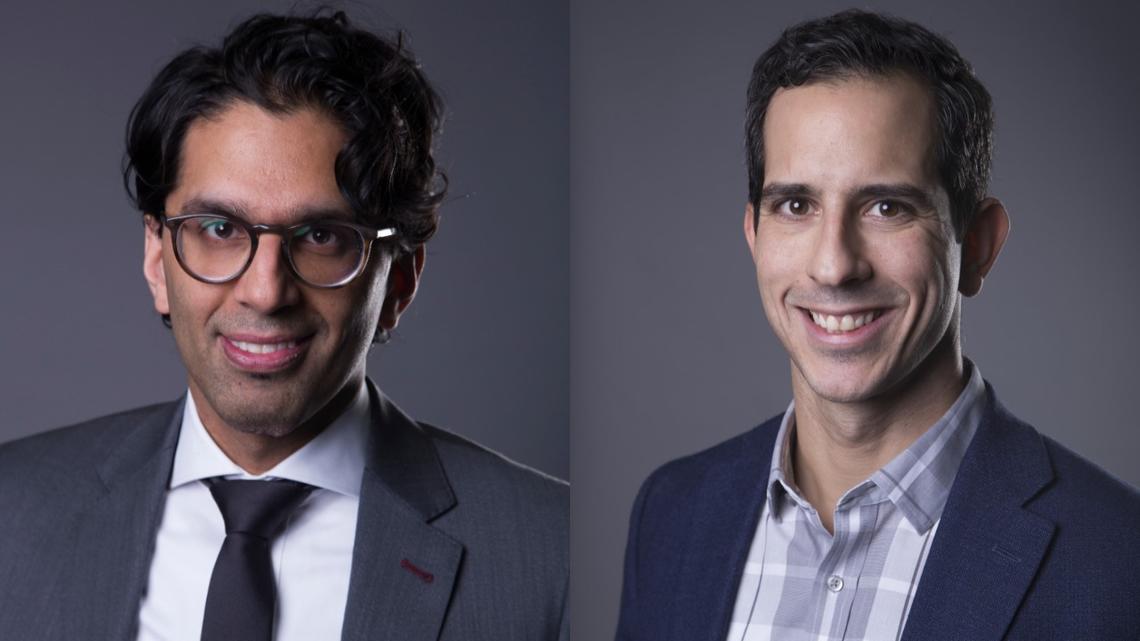April 23, 2020
Calgarians may see a new health-care model to treat COVID-19 patients

Aleem Bharwani and Gabriel Fabreau are members of MEOC, a physician pandemic response plan developed to help Calgary hospitals cope with COVID-19.
Calgary physicians are planning for the possibility of treating thousands of coronavirus patients during the pandemic’s peak infection rate, expected within weeks. They’re doing this through the newly created Calgary Medical Emergency Operations (MEOC) Physician Pandemic Response Plan, developed by members of the Cumming School of Medicine’s (CSM) O’Brien Institute for Public Health.
“We have seen these pictures of Italy and New York. We cannot say to ourselves that we don’t have any evidence of what it looks like when a health-care system gets overwhelmed by this virus,” says Dr. Gabriel Fabreau, MD, MEOC lead. “We all live in Calgary, this is our home. We all have people that we love in this city. We cannot allow this health system to fail.”
If health-care workers get sick with the virus, the impact on the health system can be devastating.
“If your providers get infected, they may unknowingly, asymptomatically spread infection to patients, or they may become symptomatic or isolated — in which case they cannot provide care,” says Dr. Aleem Bharwani, MD, a MEOC co-lead, and a clinical associate professor in the Department of Medicine.
“When health-care workers get removed from being able to provide care, the societal damage and impact of this virus becomes even more dramatic — but this is something we at least have some control over.”
The pandemic response plan would see physicians with experience outside of managing respiratory infections such as COVID-19 in acute care work in a team model, with specialists including general internists, respirologists and nephrologists — blending expertise to meet demand.
“Our work is focused on being as proactive as possible and staying ahead of the pandemic so we can continue to provide the best care for all Albertans,” says Dr. Peter Jamieson, MD, physician co-lead, Alberta Health Services (AHS) Emergency Co-ordination Centre Operations Section.
“Collaborating with community partners like the University of Calgary helps us identify the required resources and how they can best be implemented rapidly and effectively.”
Focus on safety
The proposed MEOC safety plan includes mandatory personal protective equipment (PPE) training, health checks at each shift, distancing checks, and hospital pre-departure decontamination protocols. Safety will also be key in determining the length and number of shifts doctors work.
The group has drawn on AHS and the University of Calgary models for anticipated COVID-19 infection rates — illustrating different scenarios, such as highly effective public health measures, moderately effective public health measures, or no public health measures. Bharwani says those figures show the importance of public health measures, like physical distancing, and how they affect what is seen in the health system.
“With many public health interventions, it takes years to see the impact of those measures in the hospital. Social distancing, however, impacts health systems very quickly," he says.
For those outside public health, social distancing clearly illustrates the potency of public health to improve health outcomes for everybody
Despite the COVID-19 situation “changing by the hour,” Bharwani says “over 200 physicians who have enrolled have already completed MEOC training and others have begun orientation sessions at each of four Calgary hospitals to get familiarized with novel care pathways and informatics tools collaboratively developed by an incredible team.”
MEOC is supported by members of the CSM’s Department of Medicine, who comprise MEOC leadership and its working groups, and a wide range of groups within AHS and UCalgary, including AHS Zone Emergency Operations Command (ZEOC), AHS Clinical Informatics, AHS Analytics, AHS COVID-19 Scientific Advisory Group and related strategic clinical networks, AHS Calgary Zone Medical Affairs, Well Doc Alberta, the Centre for Health Informatics, and the Office of Continuing Medical Education and Continuing Professional Development.
The members of MEOC are: Dr. Gabriel Fabreau, MD, (lead) and co-leads Dr. Sachin Pendharkar, MD, Dr. Evan Minty, MD, and Dr. Aleem Bharwani, MD, working with approximately 40 other physicians from the Cumming School of Medicine Department of Medicine.
Aleem Bharwani is the director for public policy and strategic partnerships at CSM and policy lead for the O’Brien Institute for Public Health. He is also a clinical associate professor in the Department of Medicine.
Gabriel Fabreau is an assistant professor in the departments of Medicine and Community Health Sciences at the University of Calgary and a member of the O'Brien Institute for Public Health.
UCalgary resources on COVID-19
For the most up-to-date information about the University of Calgary's response to the spread of COVID-19, visit the UCalgary COVID-19 Response website.





